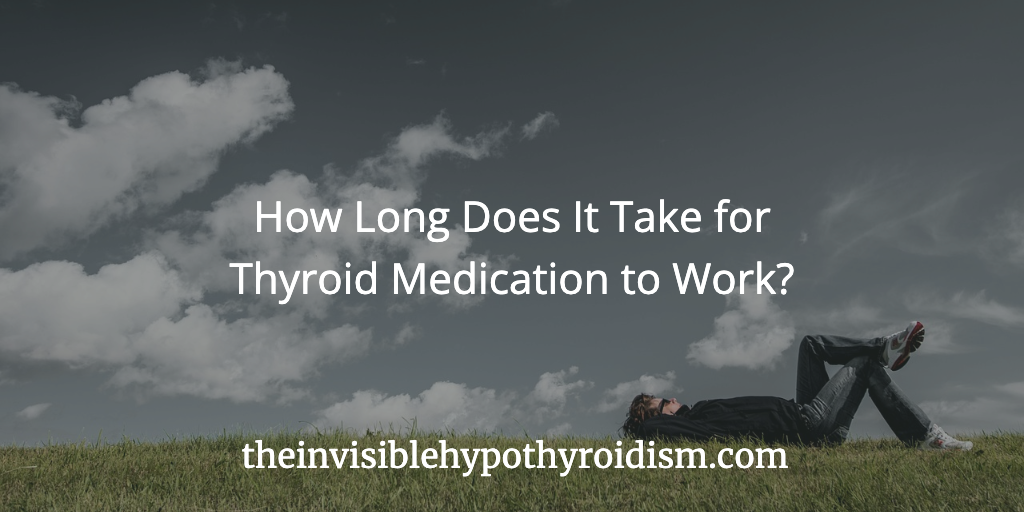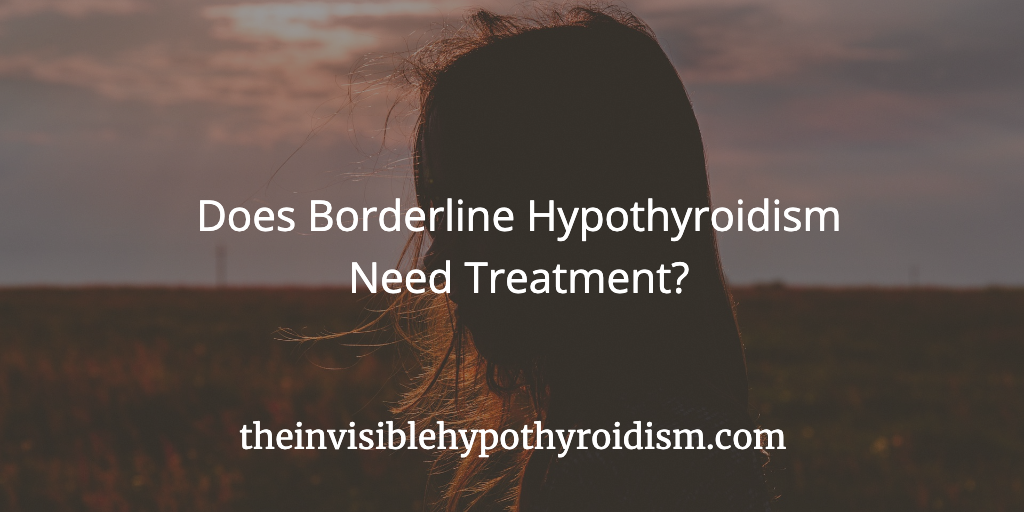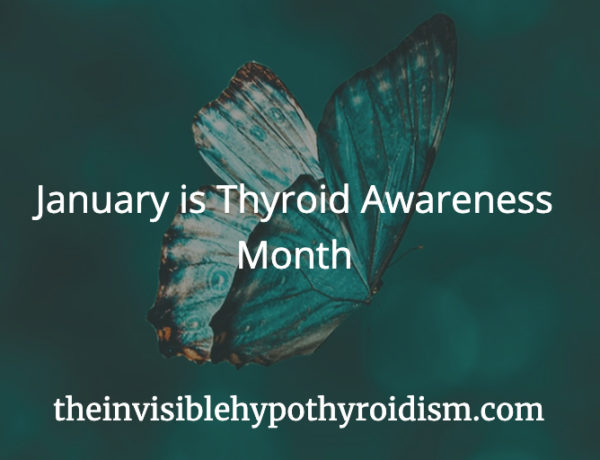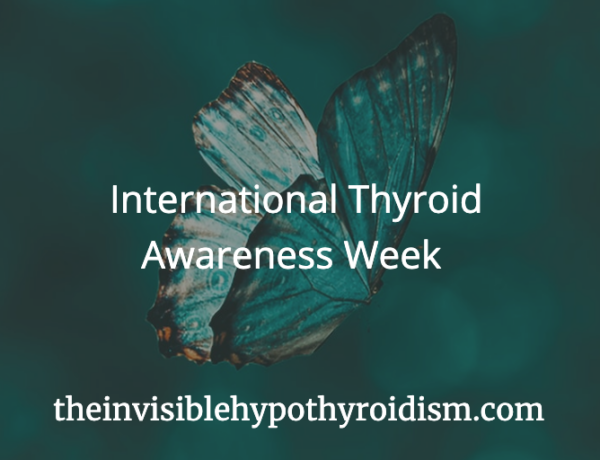Originally published on 8th May 2018 Last updated on 15th March 2024
Receiving a diagnosis for hypothyroidism or an underactive thyroid, Hashimoto’s, subclinical or borderline hypothyroidism, can create a whole mix of emotions.
I have people ask:
- “I’ve just started thyroid medication. How long will it take me to feel well again?”
- “When will I feel better?”
- “When will I be back to normal?”
As well as feeling relieved that you finally have an answer for why you’ve been feeling so unwell, you may also feel impatient when waiting for your thyroid medication to work.
So, how long after starting thyroid hormone replacement medication, will it take for you to get back to how well you used to feel?
(For those of you reading this and have been on medication for a while and are shouting at the screen “Never!”, please read to the end of this article!)
I wish I could tell you how long it will take. I really do.
The thing is, it can be different for each person.
Why? Because the point at which we finally get that diagnosis and the thyroid hormone replacement our body so desperately needs, it is commonly so late in the progression of the condition, that we may then have other issues that now need addressing too.
The Thyroid Jigsaw Puzzle
You see, whilst some people take their thyroid hormone replacement medication and within a few weeks feel great, many of us (and I would hazard a guess that most of us) do not feel loads better this quickly. But please don’t fret, because you can feel well again.
It just takes time to address all that is going on inside your body.
Each person’s ‘thyroid health journey’ is unique:
- Some thyroid patients find that their first try of thyroid medication alone does very well to bringing them back to good health.
- Whereas for others, they find they either require medication dosage adjustments (i.e. the initial dose of medication given wasn’t enough), a switch to a different type of medication (many patients don’t respond well to T4-only Levothyroxine or Synthroid, but respond better on T3 and NDT medications)
- or some further attention or problem solving in other areas.
I talk about getting our health back on track with hypothyroidism and Hashimoto’s as a big jigsaw puzzle. There can be multiple pieces, and combinations are different from person to person.
What Are the Puzzle Pieces?
For a lot of us with hypothyroidism and especially autoimmune hypothyroidism, we also have other areas that require a look, such as:
- optimising thyroid hormone levels (as opposed to just being ‘in range’)
- addressing high thyroid antibodies
- adrenal dysfunction / adrenal health
- vitamin deficiencies (or low levels still causing issues and symptoms)
- gut issues, low stomach acid
- poor diet / diet considerations
- exercise considerations
- sex hormone imbalances
- food sensitivities
It is possible to live a good quality, full life with hypothyroidism however, but each person needs to piece together their own thyroid puzzle to figure out what needs addressing to get them there and restore their health.
For some, it’ll be low iron and Vitamin D levels, for others just adrenal dysfunction or poor gut health. But for some of us, we’ll need to have more patience because more work will be required.
How Long it Took for Me to Get Better
I’ve had to address a change in medication from Levothyroxine to Natural Desiccated Thyroid (as Levothyroxine didn’t help me), low ferritin, low Vitamin D, high Hashimoto’s antibodies, adrenal dysfunction, sex hormone imbalance (oestrogen dominance), gluten sensitivity, leaky gut, candida and more over the last few years.
However, by addressing each of these, I’ve gotten closer and closer to the level of health that I remember having prior to developing autoimmune hypothyroidism. It really is like a jigsaw and each person’s will be made up of different pieces for them to address and slot back in to place. For a list of things to investigate for your own thyroid puzzle, please see this list.
I found that seeing a functional medicine practitioner who applied a holistic approach to healing my body, was really helpful.
See also: The Different Types of Doctors and Practitioners Who Make Up Your Thyroid Healthcare Team
So, How Long Will It Take You to Feel Well Again?
It’s going to depend on:
- how many areas / issues you need to address
- how well you take control of your health and advocate for yourself
- and how your individual body reacts and adjusts.
It can take a few months to settle in to your thyroid medication dose, once you have reached the right dose for you. But it can take a while to get this right.
For some thyroid patients, it takes quite a while to feel better, whereas for others it is quicker.
Do also bear in mind that, often, the longer you’ve been unwell without diagnosis and medication, the more likely you’ll have more issues to address, as untreated hypothyroidism and Hashimoto’s can send other things out of whack over time.
It’s also important to remember that whilst many people do eventually return to a good quality of life and good health, expecting to return to exactly how you were pre-hypothyroidism/Hashimoto’s isn’t totally realistic either.
Related post: Accepting I’ll Never Be as Healthy as I Once Was and Why That’s OK
Your body is still going to handle and react to things differently now that you live with a lifelong, chronic health condition, so be kind to yourself and learn how to manage it as effectively as you can.
Keep in mind that you need to create a healthy work-life balance, stress management plan and regimen to promote good health. Much of this can include reducing work hours, scheduling in rest days to allow your body to recharge, taking supplements that support you, eating and drinking well and getting good quality sleep.
If you’ve just been diagnosed, please see my super helpful list of frequently asked questions and answers here!
Related Post: What to Expect When You Change Thyroid Medication Dose
Related Post: How to Get Natural Desiccated Thyroid or T3 Medication in the UK
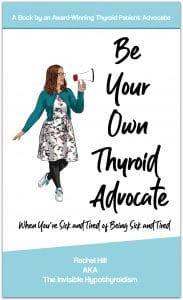
The book Be Your Own Thyroid Advocate: When You’re Sick and Tired of Being Sick and Tired, which builds on this article in detail and covers how to get your health back with a thyroid diagnosis. Reclaim your thyroid healthy life as Rachel has done.
You can click on the hyperlinks in the above post to learn more and see references to information given.

